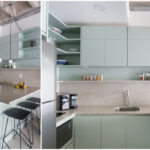How Designers Make the Most of Every Inch
Designing a small kitchen can be a rewarding challenge that tests your creativity, innovation, functionality, and style. With limited space, every decision, from layout to material selection, must be carefully considered to maximize utility while maintaining style.
The goal should always be to create a space that feels welcoming and spacious, regardless of size, by incorporating smart design features and inventive ideas. By strategically using vertical space, adding multifunctional features, or selecting specific colors, a small but well-designed kitchen can nevertheless provide the impression of being an expansive space in your home.
Consider how these professional designers made the best use of the available space to create a stylish and highly functional small kitchen.
Continuity of Materials


This 500-square-foot New York apartment lives much larger than its size would suggest. Jordan Parnass Architecture designed this small studio, creating a highly functional and cultivated space with separate and distinct zones, as opposed to the more popular open-living designs. The design is seamless, thanks to the use of a restrained material palette in the kitchen and throughout the home, which increases visual continuity throughout. The kitchen design maximizes vertical storage while minimizing hardware throughout the room for a more seamless appearance.
Use of Vertical Walls


The architects at 3XA were tasked with renovating this small 312 square foot apartment. This building has lovely architectural details and tall ceilings, giving the small apartment a gracious appearance despite its small size.
The architects used a simple color palette to create a pleasing contrast to the subtle wood tones. The main kitchen components take up only one wall, but the design makes use of the high vertical space to provide ample storage for the small kitchen. The open bar table creates a subtle separation from the rest of the living space while also providing additional counterspace when needed.
Minimize Clutter


Ian Lee is the creator of the LIFE apartments in Seoul, South Korea. These micro-apartments measure between 16 and 23 square meters. All of these spaces have a simple design with pale birch wood floors and walls, as well as sliding doors that the owners can close for privacy or open to expand their living space.
These individual homes include a similarly minimalist communal kitchen, which is intended to foster more integrated living within the housing complex. This kitchen design features the same birch veneered surfaces on its floor to ceiling cabinets. It maximizes the available storage space to reduce visible clutter and maintain the minimalist aesthetic.
Use Small Appliances


Small apartment kitchens can still be highly functional; it just depends on how you use the space. Designers Andrey Karasev and Lina Liserva chose small appliances over full-sized options for this small kitchen apartment in order to maximize the cabinets and dining space They also used the tall walls for vertical storage, minimal hardware, and lacquered surfaces to reflect natural light.
Integrate the Kitchen Into the Living Space


In this Japanese-style apartment, forever_stu collaborated with Rita Petkevičienė to create a kitchen that blends seamlessly with the rest of the interior. Natural materials and a simple color palette provide visual continuity throughout the space. The use of light colors keeps the space bright but serene.
Movable Walls


This Milan, Italy, apartment uses clever moving walls to make the most of its 322 square feet. The designers, PLANAIR, optimized the kitchen layout by maximizing the space with cabinets and creating a false wall that you can move when you want to open up the kitchen to a dining and sleeping area.
Make it Inviting With Fresh Greenery


Fresh plants and flowers are an excellent way to make a small kitchen more inviting and visually appealing. Igorjosif brightens up his entire kitchen with just a few vibrant orange flowers. Look for unique ways to incorporate greenery into your small kitchen, such as hanging planters, window sill gardens, and small plants on the countertop. Herb gardens are ideal in kitchens because they add flavor to your food while also bringing you joy.
Optimize Natural Light


You should always seek to optimize the amount of natural light in your small kitchen, even if it does not have windows in the immediate area. Sergi Pons, the designer of this apartment, used both reflective surfaces and light colors to bring more natural light into the kitchen. He chose a mirrored backsplash to reflect the natural light from the windows across the room, as well as shiny, light-colored cabinets to set the kitchen apart from the dark, organic backdrop.
Strategic Use of a Vibrant Color


The owners of this Paris apartment commissioned architect Pierre-Louis Gerlier to create a spare and stylish space that functioned with the ease of a hotel. Gerlier removed all interior walls to make an open floor plan and lightened the interior colors. To draw the eye and distract from the small space, he strategically added a bright pop of green to the white and natural wood living area. Rather than a full kitchen, this design features a one-wall kitchenette that is integrated into the rest of the interior space.
White and Wood Kitchen


Using light colors is a tried-and-true method for maximizing visual space, but adding contrast with natural texture to the color palette gives the design more depth. A Little Design collaborated with the owners to maximize the visual and physical space in their 236 square foot apartment. The kitchen has seamless white cabinets and an open wood shelf to complement the wood accents throughout the apartment.
Contrasting Color and Shapes


This stark white and black home is a departure from other rustic styles that seek to blend in with the surrounding environment. This 92-square-meter adobe home, designed by Working Holiday Studio, is reminiscent of brightly colored Mediterranean architecture, making it stand out against the buff desert. The interior design of the house and kitchen also uses white to expand the visual space, with occasional pops of black, yellow, and natural wood for contrast. The interior’s playful use of shapes and colors combines Scandi and Japanese design.
Bright Color Blocking


Light colors work well to expand visual space in a small apartment, but a few strategically placed pops of color can add energy, personality, and interest without overwhelming the space. In this Barcelona apartment, Egue y Seta incorporated bright blocks of color throughout the apartment, using both architectural and decorative elements. In the kitchen, they added a block of color to the kitchen wall and used the items on the open shelves to incorporate more color into the kitchen.
Take the Maximalist Approach


If you enjoy living large in your small kitchen, a maximalist design may be right for you. This designer, Marie-Lyne Quirion, does not let her small space limit her vision of what she can create in her space and lets her personality shine through in the design. Quirion combines IKEA cabinets with vintage finds to create a cozy, eclectic, and fun kitchen. In her small kitchen layout, she uses open and closed shelving, a small seating area, and colorful kitchenware to keep everything within reach.
Stowaway Cabin Kitchen


This vacation cabin thrives on its innovative design and small footprint. The architect, Pekka Littow, utilized dark interior and exterior colors to seamlessly connect the space and blend it with the natural environment. To simplify the interior design, they placed the kitchen behind closed doors to minimize its visual and physical impact on the living space.
Natural Colors and Textures


This tiny house is a testament to the design impact that you can have in a small space. The designer, Matt Battain, and owner, Lee Para, collaborated to create this warm, Scandi-inspired tiny dwelling. They utilized vibrant botanical wall coverings, fresh greenery, warm wood finishes, and brightly colored textiles to make the kitchen feel spacious and inviting.
Open Living Design


Daher Jardim Arquitetura’s goal for this house design was to create a low-cost, light-filled living space. They achieved this by using a simple and open floor plan, light interior colors, and large openings to let in plenty of natural light. The small kitchen design is straightforward yet highly functional. It is open to the rest of the house to maximize the visual continuity of the space.
Add a Dining Area


Small kitchen spaces can function better with the addition of a dining space, even a compact one. This kitchen, designed by the owner, Tina Barisky, cleverly includes a small table by bisecting the floor space between the living room and kitchen. Other options for including a seating area in your small kitchen include a bar table that doubles as a counter, a banquette built into the wall, or a fold down table that appears only at meal times.
Create a Kitchen Zone With Distinct Flooring


It can be difficult to visually distinguish a separate kitchen space within an open floor plan. SKNYPL used different flooring to visually separate the kitchen from the rest of the living area while maintaining continuity with the wall and ceiling materials. This was also a practical choice, as the micro-concrete floor in the kitchen is more tolerant of the high moisture environment than wood floors.
Utilize an L-Shaped Layout


Jessica is the owner and designer of this quirky Chicago apartment. It features a colorful interior mixed with vintage and retail finds. The kitchen has a usable L-shaped layout. An L-shaped kitchen offers several advantages for small kitchen designs. It minimizes problematic corner space and helps facilitate an efficient work triangle.
Soft Colors


Architect Elisa Albuquerque redesigned this Brasilia apartment to provide a temporary but functional living space for owners undergoing a large-scale renovation of their permanent home. The terrace and sea views were particularly important to the owners, but they also wanted a peaceful interior living environment.
The home has a soothing style thanks to its delicate textures, lighting, and colors. The kitchen is open to the living room and its large doorways, so it feels spacious, but the soft blue/green cabinets set it apart from the rest of the house.
Under-the-Stairs Cabinets


Pine Crest Tiny Home’s tiny house makes efficient use of every square inch of available space. Under the stair storage is located directly behind the kitchenette, which helps to contain the clutter that inevitably accumulates in even the smallest of kitchens.






